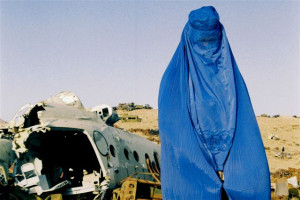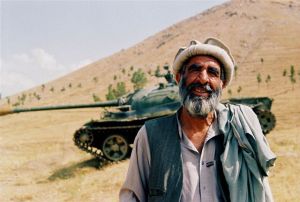Although it appears that the 12 year Afghan war will end in stalemate in 2014 with Afghan resistance groups poised to pounce as NATO troops are on the way out, the Taliban have taken considerable beating as well and have been compelled to alter its position dramatically. Not only have they softened on a possible stay by allied forces, they have also liberalized their stance on the status and rights of women, giving political space to other ethnic groups, and holding elections on the model of modern parliamentary political systems. There is always the possibility that these are public statements that will be reversed when the NATO allies pack up and leave. But many changes have occurred in the Taliban’s policies nevertheless, since they decided to attend an “unofficial” peace conference in Paris in December 2012. Needless to say, the very act of participating in this conference itself reflects a change going on deep inside the Taliban policy circles. The allies have responded by engineering the release of Mullah Abdul Ghani Baradar in Pakistan, the Afghan Taliban’s second in command. This was an effort to catalyze a peace process although so far it has not a pause to the Taliban’s violent attacks on Afghans, Americans, friends or allies. Nonetheless, the transition that has been and is taking place among the Taliban leaders is affected by the three main factors
1.Prospects of the withdrawal of the US forces in 2014.
2.Need for establishing a central government in Afghanistan which would be corruption free and competent enough to bring to life the socio-economic uplift of the people in Afghanistan. The imperative need of a central government in the post-2014 scenario is what perhaps the most serious reason for the Taliban’s gradual transformation.
3. It is becoming increasingly improbable that the US would consider the option of establishing a new puppet government in Afghanistan, or consider giving that government solely to the Northern Alliance. The reason for this possibility is that despite being in the government with full US/NATO support for over a decade, Northern Alliance has not only failed to deliver, it has also caused the germination of severe governance problems. Additionally, Taliban have demonstrated superior governance pattern in the areas under their control.
At the Paris peace conference, the Taliban made it clear that the question of establishing peace was contingent on the withdrawal of allied forces. However, they also made those conditions clear, fulfillment of which might pave the way for a negotiated settlement. For example, the Taliban’s call for a new constitution as a precondition for joining the peace process and dialogue reflects the inner logic of their policy. They made it clear that no peace could be established under the old constitution, which was framed under the shadow of the “B-52 bombers of the invaders.” The Taliban also made it clear in the regard of the future government, declaring that they do not seek to rule Afghanistan on their own as they did in the 1990s.
The new constitution, the Taliban said, should not only guarantee fundamental human rights, including those of women, but also be “approved by the people” – a nod to a possible referendum and a possible way of deciding the future through electoral means rather than another prolonged period of bloodshed and civil wars.
The Taliban’s new stance reflects not only the generally prevailing war-weary mood but also that they have learned bitter lessons from the history of warfare. However, it is yet to be seen how and in what manner this new policy is translated into reality, given that the Taliban are by far the strongest group in Afghanistan and have the capacity to establish their own rule as they did in the 1990s. But it must be realized that the circumstances were markedly different from those today.
Since the Paris conference, a number of other changes have also occurred, which show that there are possibilities of resolving certain issues between the Taliban and the US.
A number of studies have been conducted to grasp the ground realities. Among these is a 2012 study by the Royal United Services Institute for Defense and Security Studies), a British defense and security think tank, “Taliban Perspective on Reconciliation,”
The RUSI team interviewed four senior Taliban figures on the basis on anonymity, who referred primarily to the Quetta Shura of Taliban led by Mullah Mohammad Omar, the primary vehicle driving the insurgency. The four were a former Taliban minister familiar with the workings of the Quetta Shura’s Political Committee and closely associated with Mullah Mohammad Omar; a former Taliban deputy minister and Taliban founding member; a senior former mujahedeen commander and lead negotiator for the Taliban who has never been part of the Taliban; and an Afghan mediator with extensive experience in negotiating with the Taliban as recently as the late 2000s, and has never officially been part of the Taliban.
It is a comprehensive report. The main aspects presented in the paper show a remarkable transformation taking place in Taliban circles.
The participants did express a general willingness prevalent among the Taliban to renounce links with international terrorist organizations such as Al-Qaeda, provided it was built as a process into a comprehensive peace settlement.
Drone attacks will have to be stopped even if remaining Al-Qaeda linked figures were identified.
Although the Taliban have not yet publicly accepted the idea of ceasefire; it is very possible that they would do so under the right circumstances.
The Taliban believe there is no real foundation for elections under the current regime because Karzai is utterly corrupt and could not be relied upon to deliver clean elections, nor can the Taliban support a Karzai government. If an agreement is reached, an interim period of three years would be needed between a nominal agreement and the elections, in which Taliban representatives would campaign like other election candidates and political parties.
They may work with other members of the parliament, but there is no chance of working with Karzai, his family members or others with a record of corruption. Since a key imperative would be to root out corruption, the question is not who the Taliban will work with, but who is willing and able to work with the Taliban.
The Taliban are prepared to accept a long-term US military presence although the US military bases and the continuing presence of soldiers at a level that doesn’t impinge on Afghan independence and religion. The US military operating in Afghanistan up to 2014 out of five primary military bases (Kandahar, Herat, Jalalabad, Mazar-e-Sharif and Kabul) could be agreed through negotiation although the Taliban would need to consider this in the context of what is best for Afghan national security.
The US’s presence would be acceptable if it contributed to Afghan security, but not if the Americans would use the bases to launch attacks against neighbors such as Iran or Pakistan.
Given the Taliban’s changing stance, and the ground they have covered in bridging the gap, it can be hoped that peace would be established. However, one must not be unmindful of the challenges hindering the way. First of all, there are good reasons to doubt the Taliban’s given position on various issues. Given the fact that the rank and file believe their control of Afghanistan in a post-2014 scenario is inevitable, it seems paradoxical then to suggest that the Taliban are really interested in engaging in a dialogue with the US.
Second, if the Taliban agree to the post-2014 stationing of residual US forces, they would inevitably be used to protect the vital interests of the US, and therefore, inimical to the interest of the Taliban specifically, and of Afghanistan generally—hence, continued instability and prolonged conflict.
Third, there is the ethnic lava brewing inside Afghanistan. The Northern Alliance group would not agree to the re-admission of the Taliban into the mainstream political system because this would strip the non-Pashtun groups, especially the Tajiks, of any prospects of exercising power, since they form only 20 to 25 percent of the population while the Pashtun constitute more than 40 percent.
Fourthly, it is uncertain how the hardliners among the Taliban would react to prospects of negotiated settlement.
However, as for the Taliban’s position, its credibility can be judged from the prevailing circumstances, especially the war weary mood among common Afghans, and the consequent imperative on the Taliban to bring an end to military conflict as soon as possible. As a matter of fact, neither the Taliban nor the Tajiks can afford to continue fighting under such circumstances.
Therefore, there are circumstantial reasons to believe that the initiatives taken by the Taliban, such as attending the Paris conference and opening up a political office in Qatar, are aimed not only at convincing the world of the necessity of bringing an end to conflict by recognizing them (Taliban) as the most essential element in peace process, but also at convincing common Afghans of the efforts they are making to end conflict. The transformation, in a way, is as much a part of political strategy as of political necessity, and in both cases, it seems genuine. It can be refuted only at the expense of prospects of peace. Equally, this process indicates the direction the war-torn Afghanistan is likely to take in post 2014-scenario. However, it must be bear in mind that the Taliban have not yet made their official position clear on these issues, making the entire process full of uncertainties and difficulties. But, on the other hand, it would also be illogical to expect unfolding of the process in a smooth manner since the Taliban are most likely to drag it along in order to increase their bargaining power and equally reduce that of the US.
Salman Rafi Sheikh, research-analyst of International Relations and Pakistan’s foreign and domestic affairs. Exclusively for the online magazine “New Eastern Outlook”.


